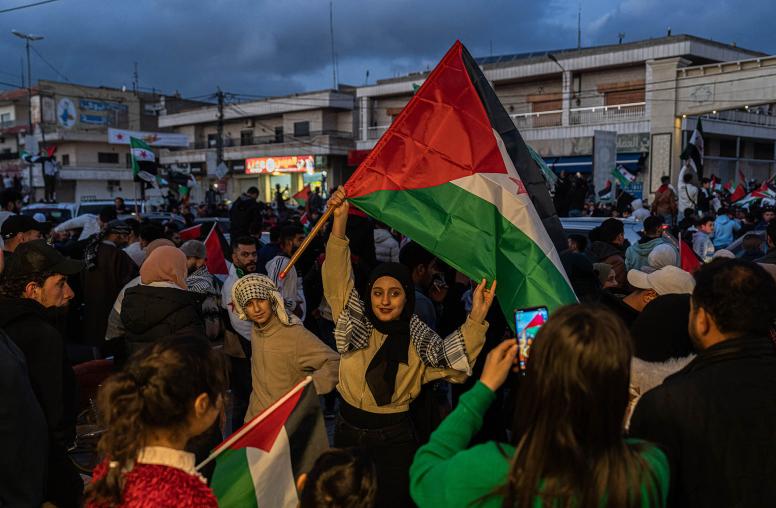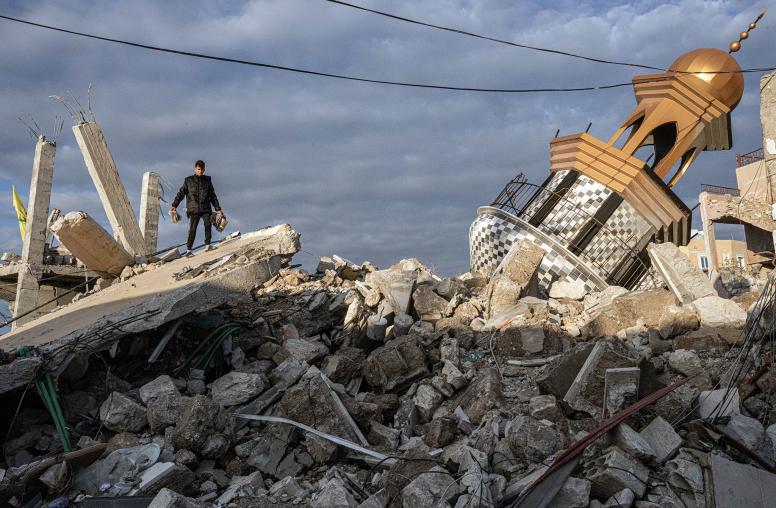Lebanon on the Brink as Reform Remains Stalled After Beirut Blast
The country desperately needs assistance, but the international community has conditioned aid on sweeping political change.
More than two months after a massive explosion rocked Beirut, the country’s twin political and economic crises continue to spiral while a COVID crisis descends upon the Mediterranean nation. International aid for repairing billions in damage and bolstering Lebanon’s flailing economy is largely contingent on sweeping political reforms that have yet to materialize. After another Lebanese prime minister resigned last month, President Michel Aoun has called for consultations next week with members of parliament to name a new premier. This comes days before the October 17 anniversary of mass protests that broke out last year, which began as demonstrations against unpopular taxes but rapidly expanded to calls for an overhaul of the country’s sectarian-based political system.

Meanwhile, against the backdrop of recent Israeli normalization agreements with the UAE and Bahrain, Lebanon is set to begin U.S.-mediated talks with Israel next week on a maritime border dispute. USIP’s Mona Yacoubian looks at what, if anything, the international community can do to propel reform in Lebanon and if the country’s crisis could motivate increased cooperation with Israel.
What more can the international community do to incentivize Lebanese political leaders to enact reforms?
To date, the international community’s efforts to leverage assistance for genuine reform in Lebanon has been unsuccessful. Despite Lebanon’s worsening socioeconomic conditions, the country’s political leadership remains stalemated, unable to name a new prime minister and agree on a cabinet, let alone move forward with critical reforms. Prime Minister Mustapha Adib was forced to resign last month when his efforts to form a government were foiled by the intransigence of Lebanon’s Shia powerbrokers, Amal and Hezbollah, who insisted that the Shia community retain control over the Ministry of Finance.
The international community—encouraged by ordinary Lebanese—continues to hold firm on its refusal to provide a large assistance package in the absence of significant reforms. French President Macron, who has spearheaded international efforts to assist Lebanon, accused Lebanon’s polarized political parties of “collective treason” in their failure at government formation. An international donors’ conference for Lebanon that was slated for this month is now scheduled for November as the international contact group for Lebanon reiterates its call for government formation.
Meanwhile, Lebanon’s economy continues its downward spiral. Adib’s resignation along with Lebanon’s dwindling foreign currency reserves and a recent spike in COVID-19 have only accelerated the country’s social and economic collapse. Poverty rates in Lebanon, already at 55 percent, will likely climb higher as the country contends with hyperinflation, now at 120 percent. In the near future, the Central Bank is expected to lift subsidies on basic goods in a desperate effort to conserve foreign exchange. Given Lebanon’s absence of an adequate social safety net, such a move will exacerbate the growing desperation of many Lebanese, potentially provoking widespread social unrest. Already, impoverished Lebanese migrants with little left to lose are attempting the dangerous trip to Cyprus by boat, with the United Nations recording a significant spike in attempts to make the treacherous journey.
Going forward, Lebanon’s fate will hinge on whether its entrenched political leaders finally acquiesce to longstanding demands for change. As Lebanon careens toward an existential moment of reckoning, the stakes could not be higher—nothing less than the survival of the state itself. Faced with mounting popular anger—and potentially growing insecurity and unrest—as well as coordinated international pressure to reform, Lebanon’s political elite may find they have no option but to move forward with structural change measures. Ultimately, their survival is intimately linked with that of the country itself: If they remain steadfast in their refusal to reform, Lebanon’s future will be imperiled and so too will theirs.
Israel and Lebanon have agreed to talks over their disputed sea border. What is behind the agreement and could Lebanon’s crises offer motivation for increased cooperation with Israel?
Slated to begin October 14, the U.S.-mediated talks between Lebanon and Israel on the maritime boundary dispute mark an important success following years of back-channel diplomacy. The Framework Agreement is limited to the modalities of the maritime negotiations, and no substantive progress is expected in advance of the U.S. elections. Separately, expert-level discussions on the disputed Blue Line land border are expected to take place under the auspices of the U.N.-sponsored Tripartite Mechanism, a conflict-management channel established in 2006 comprised of Israeli, Lebanese and U.N. Interim Force in Lebanon field officers to mediate Blue Line disputes.
Lebanon and Israel technically remain in a state of war and have no formal diplomatic ties. Nonetheless, the initiation of talks will help de-escalate tensions between Israel and Lebanon at a moment of existential crisis for Lebanon and mounting tensions in the region more broadly. Lebanon’s accelerating implosion coupled with last month’s U.S. sanctions on key Hezbollah allies likely impelled the country’s leadership (especially Hezbollah and Amal) to accept the terms of the negotiations. If successful, the negotiations would bring much-needed stability to the troubled border region and serve as an important confidence-building measure between Israel and Lebanon. However, if instrumentalized to pressure Hezbollah or create rifts between the group and Lebanese security institutions, the talks could have a destabilizing effect.



